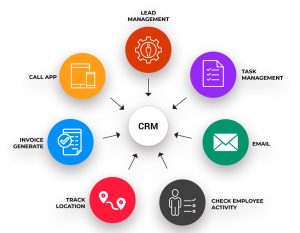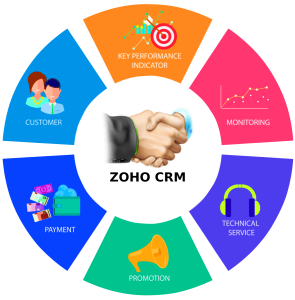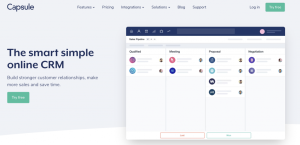
In the dynamic world of customer relationship management (CRM), the integration artificial intelligence (AI) is not an advancement; it’s a revolution. Dubbed as AI CRM, this innovative amalgamation of AI technologies with traditional CRM platforms is redefining how businesses interact with their customers. Let dive into the transformative domain of AI CRM, highlighting how it elevates customer service and sales strategies, with insights into industry-leading solutions such as Zendesk, Zoho CRM, and HubSpot CRM.
What is AI CRM?
Artificial Intelligence Customer Relationship Management (AI CRM) leverages machine learning, natural language processing, and predictive analytics to enhance traditional CRM functionalities. By analyzing vast datasets in real-time, AI CRM provides predictive insights, automates mundane tasks, and personalizes customer interactions. By prioritizing leads intelligently, forecasting sales, and offering 24/7 chatbot support, AI CRM acts proactively, optimizing customer relationships and driving significant business growth.
How AI Empowers CRM Systems

AI’s integration into CRM systems marks a significant leap forward in how businesses manage and foster relationships with customers. Let’s dive into each of the key functionalities highlighted, providing a clearer understanding of how AI transforms CRM systems from passive databases to dynamic, proactive entities.
Automated Lead Scoring
One of the standout of AI-enhanced CRM systems is Automated Lead Scoring. Here, AI algorithms analyze historical data and customer interactions to score leads based on their likelihood to convert. Factors such as engagement level, demographic information, and past purchasing behaviors are taken into account. By doing so, businesses can focus their sales efforts on leads with the highest conversion potential, optimizing resources and boosting sales efficiency.
Sales Forecasting
Sales Forecasting through AI employs predictive analytics—a statistical technique that interprets patterns in historical and current data to predict future trends. In the context of CRM, this means predicting future sales volumes, helping businesses make informed strategic decisions. For instance, if AI predicts a sales dip in the next quarter, a company might ramp up its marketing efforts in response. This forecasting enables businesses to anticipate market fluctuations and adapt proactively, rather than reacting to changes as they occur.
Personalized Interactions
AI takes customer data—preferences, purchase history, interaction logs—and uses it to tailor communications. This could be in the form of personalized marketing emails, customized product recommendations, or individualized support messages. The goal is to make each customer feel understood and valued by the business, increasing engagement and loyalty. This level of personalization, at scale and in real-time, was previously unattainable without AI.
Efficiency and Accuracy
AI excels at automating routine tasks, such as data entry, lead assignment, and even initial customer inquiries through chatbots. This not only speeds up operations but also minimizes human error. The result is a more efficient CRM process, where data is more accurate, and employees can dedicate time to more strategic, value-add tasks. For example, sales reps can spend more time building relationships with high-value leads rather than entering data into a system.
Continuous Learning
Perhaps one of the most powerful aspects of AI is its ability to learn and improve over time. AI algorithms are designed to refine their predictions and decisions as they process more data. This means the more an AI-enhanced CRM system is used, the smarter it gets. Continuous learning ensures that businesses aren’t just keeping pace with market and customer behavior changes—they’re staying ahead. This ongoing improvement loop enhances system accuracy and reliability, making AI a valuable long-term asset for CRM.
But the transforming CRM systems into proactive, intelligent platforms, AI empowers businesses to better predict customer needs, prioritize their efforts more effectively, and engage with customers on a more personal level. The automation of tasks frees up valuable time, while the continuous learning aspect of AI ensures that the system grows in value over time, always enhancing its offerings based on the latest data. This comprehensive enhancement of CRM functionality not only streamlines operations but fundamentally improves the way companies interact with their most valuable asset—their customers.
The AI CRM Landscape: Key Players and Their Strengths
Zendesk Sell: AI-Driven Lead Management
Zendesk Sell leverages AI to refine lead management, setting a high standard for CRM solutions. Its AI algorithms process customer data to pinpoint and prioritize leads that show the highest potential for conversion. This system equips sales teams with advanced analytics tools, enabling a deeper understanding of sales funnels and customer behaviors. The result is a more targeted sales approach, focusing efforts where they’re most likely to pay off—thus optimizing sales strategies and improving conversion rates.
Zoho CRM: Broad AI Functionalities

Zoho CRM stands as a comprehensive solution, offering a wide array of AI-driven features. Sales forecasting, powered by AI, helps businesses predict future sales trends, equipping them with the insight needed for strategic planning. Email optimization and intelligent workflow automation streamline communication and operational tasks, enhancing efficiency. Zoho’s AI functionalities are designed to cover various aspects of CRM, from improving customer interactions to automating routine processes, making it a versatile tool for businesses of all sizes.
Pipedrive CRM: AI Sales Suggestions
Pipedrive CRM differentiates itself with AI-generated sales suggestions. These insights are derived from data analysis, guiding sales teams on when and how to engage potential customers effectively. The AI system assesses past interactions and outcomes to recommend actions that increase the likelihood of closing a deal. This focus on boosting sales productivity through actionable insights helps businesses tailor their sales strategies for better results.
Freshsales: AI-Powered Chatbot Tools
Freshsales excels in providing AI-powered chatbot solutions, enhancing the realm of customer support. These chatbots can engage with customers in real-time, offering instant responses to inquiries and support requests. The AI-driven nature of these tools allows for personalized interaction based on the customer’s history and preferences, drastically improving the customer service experience. This capability ensures businesses can maintain high levels of customer satisfaction, even outside standard operating hours.
HubSpot CRM: The Best Free AI CRM
HubSpot CRM is celebrated for its free access to a suite of AI features, making it a standout choice for businesses seeking cost-effective CRM solutions. With functionalities like lead scoring, email tracking, and deal forecasting, HubSpot offers a competitive range of tools that can drive sales and marketing strategies. The accessibility of these features without a premium subscription democratizes advanced CRM capabilities, allowing even small businesses to benefit from AI-driven insights and automation.
Niche Players with Distinct AI Capabilities
In addition to these leading platforms, the CRM market is rich with niche players offering specialized AI functionalities. These solutions cater to specific industry needs or operational focuses, delivering tailored AI benefits that enhance customer relationships and business processes in unique ways. Whether it’s through advanced data analysis, personalized marketing automation, or sector-specific interaction models, these niche players contribute to the diverse ecosystem of AI-enhanced CRM solutions.
The integration of AI into CRM platforms represents a significant advancement in how businesses manage and nurture customer relationships. From lead management and sales forecasting to customer support and operation automation, AI-driven CRM solutions empower businesses to operate more efficiently and connect with customers on a deeper level. As technology evolves, the potential for AI to further transform CRM practices remains vast, promising even more innovative ways to engage with customers and drive business success.
Creatio CRM: Streamlining Operations with AI
Creatio CRM is a powerful tool that focuses on streamlining sales, marketing, and service operations with its advanced process automation and AI functionalities. What sets Creatio apart is its ability to automate complex business processes, from lead to customer service inquiries, reducing manual work and potential for error. The AI component of Creatio helps in analyzing customer data to offer predictive insights, enabling businesses to anticipate customer needs and personalize interactions more effectively. This combination of process automation and AI-driven analytics makes Creatio an excellent choice for companies looking to enhance operational efficiency and create more engaging customer experiences.
Capsule CRM: Tailored for Small to Medium-Sized Businesses

Capsule CRM targets small to medium-sized businesses (SMBs) with an emphasis on simplicity and effectiveness. Its user-friendly interface ensures that businesses can easily manage their sales pipelines, customer relationships, and organizational tasks without a steep learning curve. Integrated AI capabilities assist in analyzing sales data, providing actionable insights that help businesses focus their efforts where they are most likely to yield results. Capsule CRM’s approachable design, combined with intelligent sales management tools, makes it an attractive option for SMBs seeking to leverage AI without requiring extensive technical expertise.
Leap: Enhancing Interactions and Efficiency with AI
Leap stands out for its AI-driven insights and automation designed to refine customer interactions and improve operational efficiency. The platform leverages machine learning to understand customer behavior and preferences, enabling businesses to engage in more meaningful and personalized ways. Additionally, Leap’s automation features streamline various business processes, from managing leads to optimizing customer service workflows. This focus on using AI to both enhance customer relationships and improve internal operations makes Leap a valuable tool for businesses looking to gain a competitive edge.
Monday CRM: Customizable AI Solutions for Diverse Needs
Monday CRM prioritizes flexibility and customization, offering a range of customizable AI solutions tailored to fit diverse business workflows and customer management requirements. The platform allows companies to build their CRM ecosystem with modular building blocks, integrating AI-driven features suited to their specific operational needs. Whether it’s automating routine tasks, generating sales forecasts, or providing personalized customer service, Monday CRM gives businesses the tools to create a bespoke CRM solution. This level of customization ensures that companies don’t have to conform to a one-size-fits-all approach, making Monday CRM especially appealing to those with unique or evolving business models.
These each of CRM platforms—Creatio, Capsule, Leap, and Monday—brings distinct advantages to the table, driven by AI and automation. Whether it’s streamlining complex operations, serving the needs of SMBs, enhancing customer interactions, or providing customizable solutions, these platforms demonstrate how AI is becoming an indispensable part of modern CRM strategies. Choosing the right platform depends on a business’s specific needs, size, and the strategic goals they aim to achieve through their customer relationship management efforts.
The Benefits of Integrating AI into CRM
Integrating AI into CRM systems brings a multitude of benefits, including but not limited to:
- Enhanced Operational Efficiency: By automating routine tasks, AI frees staff to focus on strategic work.
- Improved Customer Satisfaction: AI-powered chatbots and personalized interactions boost customer support quality and satisfaction.
- Data-Driven Insights: Offers valuable insights into customer behavior, sales trends, and efficiency improvements.
- Reduced Costs: Minimizes manual work and errors, leading to significant cost savings.
Real-World Success Stories
- Einstein GPT by Salesforce: Performs over a trillion predictive analyses weekly, enhancing sales strategies and operational efficiency.
- IBM Consulting with Bouygues Telecom: Implemented generative AI in call centers, achieving significant cost savings and operational improvements.
Measuring the ROI of AI in CRM
To determine AI CRM’s true value, track metrics such as customer satisfaction, operational efficiency, sales forecasting accuracy, and cost savings. Successful implementation stories, like Einstein GPT and IBM’s generative AI, demonstrate AI CRM’s potential to revolutionize customer interaction and management.
Looking to the Future: AI-Powered Customer Relationships
The integration of AI into CRM systems marks a significant shift towards more intelligent, proactive, and customized customer relationships. As technology advances, AI in CRM will continue to offer deeper insights, more personalized interactions, and enhanced efficiency, setting the stage for an era of unprecedented customer relationship management.
Embracing AI CRM not only optimizes current operations but also prepares businesses for future challenges and opportunities in the realm of customer engagement and satisfaction. As companies continue to adopt AI-driven CRM solutions, the future of customer relationships looks promising, driven by innovation, efficiency, and a deeper understanding of customer needs.
Conclusion
The integration of Artificial Intelligence (AI) into Relationship Management (CRM) systems a significant evolution in how businesses approach and manage their interactions with customers. Platforms like Creatio CRM, Capsule CRM, Leap, and Monday CRM each offer unique functionalities tailored to various business needs, from automating operational processes to providing personalized customer interactions and insights through AI-driven analytics.
Creatio CRM shines in automating sales, marketing, and service operations, allowing for a streamlined approach to managing complex business processes. Capsule CRM targets small to medium-sized businesses with a-friendly interface and effective sales management tools powered by AI, making it accessible for businesses with limited technical resources. Leap focuses on enhancing customer interactions and operational efficiency through AI-driven insights and automations, offering a competitive edge in personalizing customer experiences. Monday CRM provides customizable AI solutions, catering to diverse business workflows and customer management needs, enabling businesses to tailor the CRM system to their specific operational requirements.
The core advantage of integrating AI into CRM systems lies in their ability to transform vast amounts of data into actionable insights, automate routine tasks to increase efficiency, and personalize customer interactions at scale. This not only enhances the customer experience but also drives business growth by enabling more strategic decision-making and resource allocation.
As businesses continue to navigate an increasingly digital landscape, the importance of leveraging AI within CRM platforms becomes ever more critical. The ability to predict customer needs, streamline operations, and engage customers on a personal level will set apart successful businesses in the competitive marketplace. Therefore, choosing the right AI-powered CRM platform, aligned with specific business goals and customer management strategies, is a strategic investment towards achieving enhanced customer relationships and business outcomes.
In essence, the future of customer relationship management is deeply intertwined with AI, and embracing this technology is key to unlocking new levels of efficiency, customer satisfaction, and innovation in business strategies.









